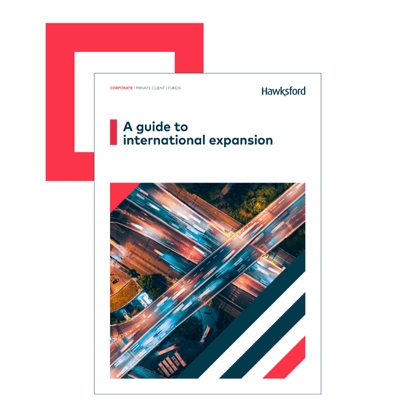Hawksford is well known for helping businesses based outside the UK to trade internationally using UK companies. There are numerous special uses for UK companies and this briefing focuses on UK Limited Liability Partnerships (common referred to as LLPs).
UK Limited Liability Partnerships (LLPs) are increasingly used in the UK as a tax efficient vehicle for non-UK international trading purposes.
They combine the benefits of corporate status (i.e. the partnership has its own legal identity) and limited liability protection for members with the ability to operate and to be taxed as a traditional partnership.
Formation
A UK LLP is formed by registration at Companies House in the UK. An LLP may be formed by two or more persons and must be a lawful, commercial venture operating for profit. The use of corporate members is allowed and there is no restriction on their place of registration.
The LLP may not have the same name as an existing company or LLP and the name must end with the words ‘limited liability partnership’ or the abbreviation ‘LLP’. The registered office of an LLP must be located in the UK at all times.
Membership
An LLP must have at least two designated members and there is no restriction as to their nationality or residence. Designated members are responsible for the management of the LLP and have additional duties compared to ordinary members which include:
- Appointment of an auditor (if required)
- Signing the LLP annual accounts
- Delivering the annual accounts to Companies House
- Notifying the Registrar of Companies of any changes in membership, registered office or LLP name
Membership ceases through the dissolution of the LLP, death of a member or by agreement with other members. Provision can be made within the partnership agreement (see below) to remove or expel one of its members for a breach of the partnership agreement.
If the number of members of an LLP falls to one for a period of six months or more, then that person is liable, jointly and severally with the LLP, for payment of its debts contracted during that period.
Cessation of membership or any change in any details of a member must be notified to the Registrar of Companies.
Partnership agreement
There is no requirement under the Act for an LLP to have a written partnership agreement. However to ensure greater ease of regulation between the members, it is recommended that a written agreement be entered into between the parties.
Normally, a partnership agreement would be expected to include details of the nature of the business, members’ shares and contributions, profit and loss sharing arrangements and management formalities as well as the duties of each respective member.
Even in the absence of a written partnership agreement, or if there are certain items not covered in the partnership agreement, default provisions are contained in the Limited Liability Partnership Regulations.
These provisions address, amongst others, the following matters:
- That all members are entitled to have equal share of capital and profit
- That all members participate in management
- That the LLP would indemnify members in respect of expenses incurred in relation to the LLP
Accounts and audit
An LLP must maintain records of its financial transactions in sufficient detail to enable the financial position of the LLP to be determined at any time.
Accounts must be delivered to the registrar of Companies no later than 9 months after the relevant period end. There are penalties for late delivery.
Only LLPs that do not qualify as small are required to have their accounts audited. To be considered as small an LLP must meet 2 of the following three conditions for two out of the last three years:
- Annual turnover £6.5m or less
- Balance sheet total £3.26m or less
- Average number of employees not more than 50
Taxation
LLPs are ‘tax transparent’ which means that each member, not the partnership, will be assessed to tax on their share of the LLP’s income or gains. Any non-UK source profits or gains made by an LLP will not be subject to UK tax unless the members are UK resident individuals or companies.
There are no restrictions on the residence or nationality of the members of an LLP and therefore, if the members of the LLP are non-resident and the income of the LLP is non-UK source, the LLP will not be subject to UK taxation. It is therefore possible to have an LLP set up in such a way as to not be liable to any UK taxation.
There is an obligation for an LLP to file an annual partnership tax return whether the partners are taxed or not.
It should be noted that LLPs with overseas members cannot generally avail themselves of treaty benefits as a result of the LLP’s tax transparent status. In determining residence status a UK LLP would be deemed resident in the jurisdiction from which it is controlled, which would ordinarily be the jurisdiction in which its members are situated.
Conclusion
LLPs can be an excellent vehicle due to the combined benefits of limited liability protection and the ability to operate and be taxed as a partnership. A UK LLP is an extremely flexible vehicle for international trade which, when correctly structured, will not be subject to UK taxation.

Updated on



